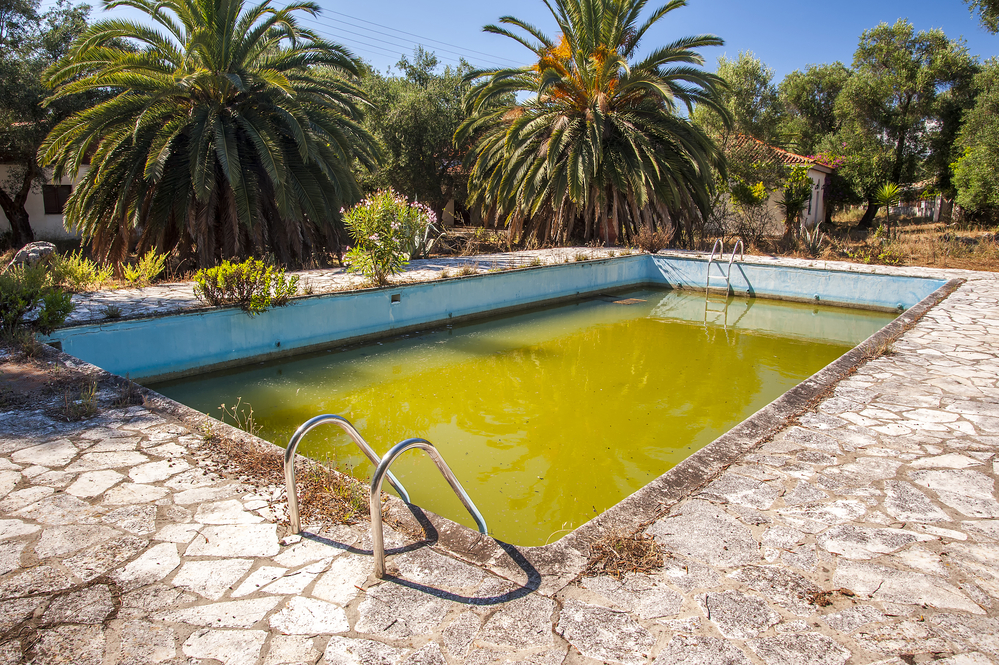When it comes to the year of your swimming pool — that is its filtration system. It is one of the most important pieces of equipment in the pool and if it isn’t working correctly you will see its impact quickly.
What does the pool filter do:
- Removes micro-organisms
- Removes bacteria and contaminants
- Filters out and remove debris
Swimming pool water can be filled with bacteria based on the people who use the pool, debris that is blown in and the very nature of the water itself. It’s crucial that not only is the pool water chemistry balanced, but that the pools’ filtration system is chugging along doing its important work behind the scenes.
Over time, the filter won’t work as well as it did when it was brand new and that’s to be expected. Your swimming pool contractor can help it have the longest useful life it can by performing inspections and upkeep and maintenance on the equipment.
Read on to see, and understand, what some of the most common pool filter issues are and how they can be fixed.
How Healthy Is Your Pools’ Filtration System?
A swimming pool filter can last up to a decade as long as it’s maintained and properly cared for. Here, though are some of the issues that may arise with a pool filter and how to recognize and address them.
Leaks
The most common problem most pool owners face with their pool filter is a leak. Thankfully, it is also the easiest to repair. A DIYer may be able to do it him or herself. A leaking filter is easy to spot because you will see puddles of water around the filter. When you see water, inspect the filter’s outer shell to see if it is cracked or has rusted through. If you see rust and cracks, it might be time to replace the tank because it will continue to get worse.

If a visual inspection shows no outward issues, look inside the filter tank. To do this, you will need to turn off the pool pump and drain the filter by opening the air bleeder. Once the water is out, remove any debris that may have collected. Cartridge filters will require you to remove it and clean it off. It may be past its useful life and you may need to replace the filter.
Inspect the o-rings and clamp bands. If you can’t see any outward reasons for a leak, call on the expertise of a pool contractor to inspect it for you.
Sand & DE in the pool
Pool owners who are using a filter that utilizes sand or diatomaceous earth (DE) filter styles may notice traces of DE or sand in the pool on occasion. When this happens, it is typically such trace amounts that the pool pump and filter will move it up and out of the pool water.
Trace amounts are one thing, but if you’re seeing pools of sand or DE settling into the bottom of the pool, the filter needs to be inspected. The leaking of sand or DE could mean there is a tear or a crack in the pipes or manifold of the filter system.
Turn the filter and pool pump off. Inspect the manifolds and pipes. If you see no outward signs of damage and the connections are properly set, it’s time to call a pool contractor.
Short cycling
Take a listen and if you hear the pool filter continuously running short cycles — turning on and turning off within a few moments. This could indicate one of these issues.
- The filter needs cleaning. If debris, algae and bacteria have built up the filter will get clogged and make the equipment work harder and could lead to short cycles. Clean the filter or replace the sand or cartridge.
- The filter wasn’t backwashed long or thoroughly enough
- The filter is clean but still running short cycles, which could mean the pool filtering system is not proportioned correctly to the size of the pool. Having a small pool filter system connected to a powerful pump in a large pool causes the filter to overwork and run on short cycles. Make sure the filter is properly sized.
Pressure is too low
The pool filter pressure should be between 8 and 15 pounds. If it’s below this normal range, it could be that there is a clog or a leak in your pool system before your pool filter. It is best to get a professional pool technician to help.
Pressure is too high
High pressure is dangerous and serious. Having too high a pool filter pressure reading is one of the more serious problems faced. High pressure is caused by a restriction of the water flow being restricted after it passes through the pool filter. When the pressure gets above 15 the filter needs to be cleaned and/or replaced.

However, if the pressure gauge starts reading 30 psi or higher, shut down the pool pump immediately since this pressure can easily cause the lids of your pool filter system to blow off. It can also cause other parts of your pool system to get damaged.
When your pool filter pressure gauge gets this high reading, it’s very likely that it’s the internal structure of your pool filter is damaged. Cracks and deformities in your pool’s return side valves and heater bypass can restrict the flow of your pool water as it passes through, which can easily cause a spike in your pressure gauge.
Pressure reading not registering
No pressure reading is as dangerous as having a huge spike in the pressure reading. If the gauge isn’t registering could be because of wear and tear.
As with any piece of equipment, especially one exposed to the elements and chlorinated water, the dial can get warped and difficult to read or for the need to work and give an accurate reading. If you’re not sure if you’re getting an accurate reading do a quick “tap test” by tapping on the glass above the pressure gauge and see if the needle pops up. If not, the gauge needs to be replaced. If the needle doesn’t pop up, the issue could be the filter’s air bleeder assembly. Shut the pool pump off, remove the pressure gauge and clean out any debris that might be blocking the air relief assembly.
The filter may not be at fault
Some issues that you believe might be filter related may not be. There are other problems that can be lurking in the pool system.
- Not all leaks near the filter tank means the leak is coming from the filter system. It could be coming from the backwash valve and could be caused by deformities in the gasket or the rotor in the multipost valve.
- Cloudy pool water could mean that the water is dirty. If the water chemistry is out of balance, the water will look cloudy and not very welcoming for swimming. Too many chemicals or too high a free chlorine reading could lead to cloudy water. Check the pool water chemistry regularly and making sure that the readings of all your pool chemicals are within the normal range can help clear your pool water and keep it from becoming cloudy.
Give your swimming pool contractor a call and ask him or her about any issues you’re seeing in the swimming pool. Don’t let cloudy water go unaddressed — it could be very costly!
